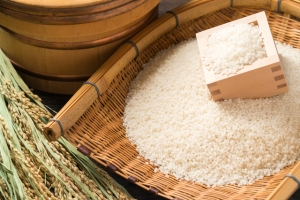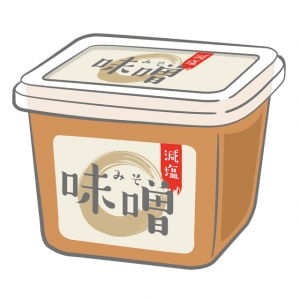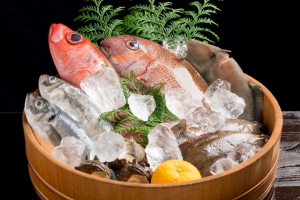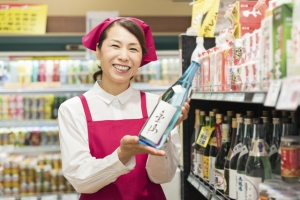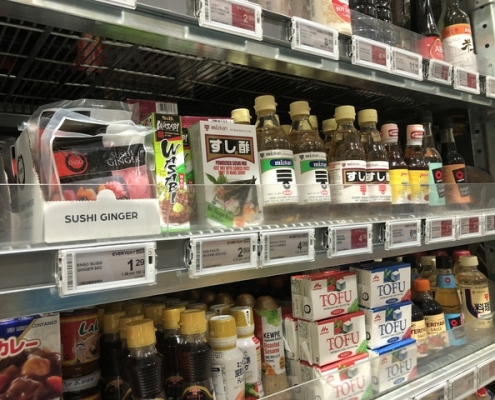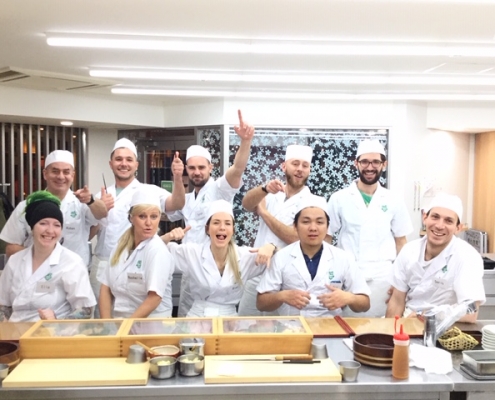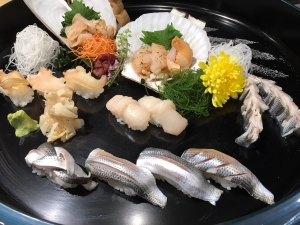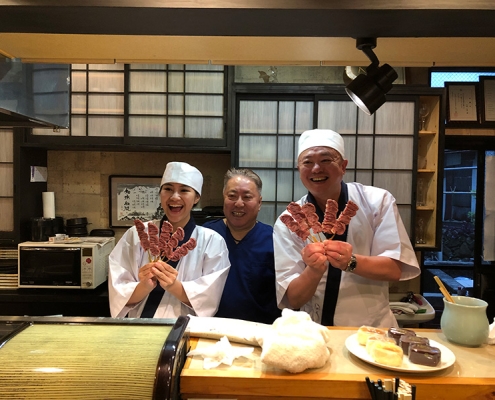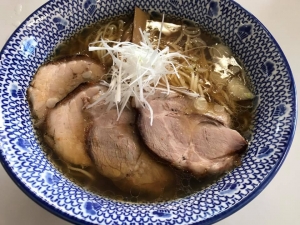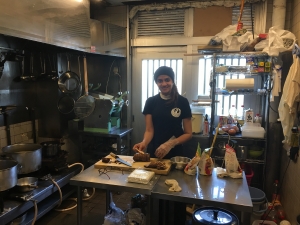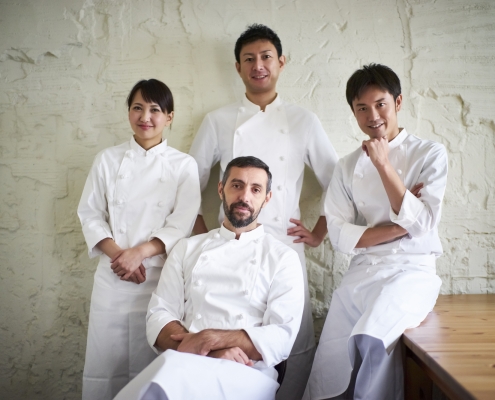Japanese grocery stores and ingredient suppliers in Germany
May 20th 2021 Updated
This page is for food lovers and professional chefs in Germany that are looking for Japanese cooking supplies.
Rice
At Japanese restaurants in Germany, Japanese rice grown in California, Spain or Italy is the mainstream. At Japanese grocery stores you can buy Japanese rice grown in Japan.
Characteristically, Japanese rice does not get dry and chewy even after it has cooled down, and in recent years, there’s been an increase in popularity of rice ball shops in Germany that use Japanese rice.
Soy sauce
You can get Kikkoman soy sauce and Yamasa soy sauce produced in Europe from Japanese grocery stores and Japanese food suppliers.
Miso
You can get miso at Japanese grocery stores and through Japanese food suppliers.
According to a survey conducted by the Japan External Trade Organization (Jetro), as of February 2015, German Japanese-food fans ranked sushi #1 (14.3%) as their “Favorite Japanese food”, ramen came in 2nd at 9.6%, and miso soup was ranked 3rd with 7.1%.
Miso soup is one of the most popular dishes in Japanese restaurants in Germany.
Seafood
Most of the seafood used in Japanese restaurants in Germany is caught in EU countries that border the North Sea, the Mediterranean Sea, and the Baltic Sea.
This is because EU countries, including Germany, require Japan to implement HACCP standards of food control, Switzerland also has similar requirements. Since opening the HACCP-compliant Toyosu market in October, 2018, it is likely that the number of Japanese companies able to export seafood to Germany will increase.
Alcohol
You can get Japanese beer, sake, shochu, etc. at Japanese grocery stores or Japanese food suppliers. General consumers usually purchase sake and shochu through online shops.
List of Japanese grocery stores and ingredient suppliers
Below is a list of Japanese food importers who wholesale to supermarkets and restaurants, as well as supermarkets that sell Japanese food to the general public.
This list consists of vendors frequently used by Japanese in your country. (Some shops carry not only Japanese cooking supplies but also kitchen ware)
Theodorstrasse 293 40472 Düsseldorf
https://www.jfc.eu/de/
Bonner Str. 353 40589 Düsseldorf
http://www.jetfresh.de/
Immermannstr. 21 40210 Düsseldorf
http://www.dae-yang.de/
Siemensring 91 47877 Willich (Münchheide I)
http://www.jikgmbh.de/
Baaderstraße 1280469 München
https://www.mikadofeinkost.com/
Thomas-WImmer-Ring 7, 80539 Munich, Germany
https://www.wagyu-master.eu/
Berlin
https://www.vinhloi.de/
Berlin, Hamburg, Düsseldorf, Frankfurt, Munchen, Stuttgart and more
https://goasia.net/
Berlin and Hamburg
http://www.asia-mekong.com/
Hamburg, Germany
https://www.japan-feinkost.de/de/index.php
Bugenhagenstr.5 20095 Hamburg
Frankfurt, Germany
https://www.umakiya.com/
Philipp-Reis-Straße 15 B3/B4, 63128 Dietzenbach
https://www.ssp-trade.eu/content/
Seyfferstraße 27 in 70197 Stuttgart
https://www.cashandcarrystuttgart.de/
Liststr. 26 70180 Stuttgart
http://www.izumi.de/index.html
Kaiserring 10, 68161 Mannheim
Aachener Str. 201-209, 50931 Köln
https://www.henglong.de/
Japanese Community Website
You can find the latest information on Japanese food suppliers on the following website.
http://www.newsdigest.de/newsde/index.php
Number of Local Japanese People
45,784 Japanese people live in Germany, as of 2018.
Number of Local Japanese Restaurants
According to “Food Products in Germany and the Possibilities of Japanese Cuisine,” a report issued by Japan Government in June 2017, Germany has only about 100 restaurants in the whole country that serve authentic Japanese cuisine.
It depends on how to count, but it is estimated that there are 1,000 to 2,000 Japanese restaurants includes fusion Japanese or Nikkei in 2020.
For German People Wanting to Study Japanese Cuisine in Japan
Do you want to study Japanese cuisine in Japan one day? Chefs Wonderland, an agency for helping foreign visitors study cooking in Japan, can make all your cooking school dreams come true.
There are two main ways to study Japanese cuisine in Japan.
One way is to enroll in a culinary school.
The other is to find work at a Japanese restaurant in Japan, although this is not very easy to do.
How Many German People are Living in Japan?
As of 2018, there are7,301 German people living in Japan.
In addition, 215,336 German people visited to Japan in 2018.
Study Japanese Cuisine at a Culinary School
If you want to attend a Culinary Technical College for Japanese people, you need to be able to speak fluent Japanese, but even if you can’t speak Japanese, you can study Japanese cuisine at one of the following schools that offer English courses lasting anywhere from one day to three months.
There are classes for beginners, short-term intensive courses to get a certificate, and private classes for professional chefs.
Tokyo Sushi Academy
The first and the most popular sushi school in the world.
Japan Culinary Institute
Japanese culinary training including sushi, kaiseki, yakitori, wagashi and more.
Miyajima Ramen School
More than 1,000 graduates from over 50 countries.
International Ramen School
Ramen study program combined with OJT
Study Japanese Cuisine While Working
Under the current immigration laws, foreigners have very limited opportunities to work in restaurants in Japan, you would need a working holiday visa, a spouse visas, or a type of special activity visa issued only to a few people. If you want more information on studying Japanese cuisine while working in Japan,
please see the following article.
Working Holiday in Japan
Working holiday visas are issued to German nationals between the ages of 18 and 30. If you can get a Working Holiday Visa, you can enjoy vacationing and working in Japan for up to one year.
If you are thinking about going on a Working Holiday to Japan, please see the following article.
Japan Working Holiday Guide – 15,000 youth get working holiday visa every year



